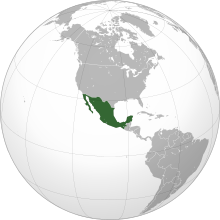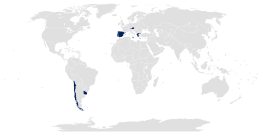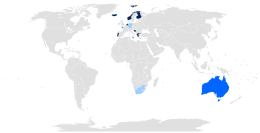The Inter-American Commission on Human Rights is an autonomous organ of the Organization of American States (OAS).

Intersex people are individuals born with any of several sex characteristics including chromosome patterns, gonads, or genitals that, according to the Office of the United Nations High Commissioner for Human Rights, "do not fit typical binary notions of male or female bodies".

Intersex Awareness Day is an internationally observed awareness day each October 26, designed to highlight human rights issues faced by intersex people.
Advocates for Informed Choice, dba interACT or interACT Advocates for Intersex Youth, is a 501(c)(3) nonprofit organization using innovative strategies to advocate for the legal and human rights of children with intersex traits. The organization was founded in 2006 and formally incorporated on April 12, 2010.

Intersex civil society organizations have existed since at least the mid-1980s. They include peer support groups and advocacy organizations active on health and medical issues, human rights, legal recognition, and peer and family support. Some groups, including the earliest, were open to people with specific intersex traits, while others are open to people with many different kinds of intersex traits.

The International Intersex Forum is an annual event organised, then later supported, by the ILGA and ILGA-Europe that and organisations from multiple regions of the world, and it is believed to be the first and only such intersex event.

Mauro Cabral Grinspan, also known as Mauro Cabral, is an Argentinian intersex and trans activist, who serves as the executive director of GATE. A signatory of the Yogyakarta Principles, his work focuses on the reform of medical protocols and law reform. In July 2015, Cabral received the inaugural Bob Hepple Equality Award.

Intersex people are born with sex characteristics, such as chromosomes, gonads, or genitals, that, according to the UN Office of the High Commissioner for Human Rights, "do not fit typical binary notions of male or female bodies."

Intersex people are born with sex characteristics, such as chromosomes, gonads, or genitals that, according to the United Nations Office of the High Commissioner for Human Rights, "do not fit typical binary notions of male or female bodies".

Intersex people are born with sex characteristics, such as chromosomes, gonads, or genitals that, according to the UN Office of the High Commissioner for Human Rights, "do not fit typical binary notions of male or female bodies". "Because their bodies are seen as different, intersex children and adults are often stigmatized and subjected to multiple human rights violations".

The following is a timeline of intersex history.

Intersex people in the United States have some of the same rights as other people, but with significant gaps, particularly in protection from non-consensual cosmetic medical interventions and violence, and protection from discrimination. Actions by intersex civil society organizations aim to eliminate harmful practices, promote social acceptance, and equality. In recent years, intersex activists have also secured some forms of legal recognition. Since April 11, 2022 US Passports give the sex/gender options of male, female and X by self determination.

Intersex people in Germany have legal recognition of their rights to physical integrity and bodily autonomy, with exceptions, but no specific protections from discrimination on the basis of sex characteristics. In response to an inquiry by the German Ethics Council in 2012, the government passed legislation in 2013 designed to classify some intersex infants to a de facto third category. The legislation has been criticized by civil society and human rights organizations as misguided.

Since March 15, 2022, Chile bans discrimination based on "sex characteristics" under Law 21,430 on Guarantees and Integral Protection of the Rights of Children and Adolescents. Between December 2015 and August 2016, the Chilean Ministry of Health issued a regulatory suspension of non-necessary cosmetic medical interventions on intersex children. The guidelines were replaced by guidance permitting intersex medical interventions.

In 1999, the Constitutional Court of Colombia became the first court to consider the human rights implications of medical interventions to alter the sex characteristics of intersex children. The Court restricted the age at which intersex children could be the subjects of surgical interventions.

Intersex people are born with sex characteristics, such as chromosomes, gonads, hormones, or genitals that, according to the UN Office of the High Commissioner for Human Rights, "do not fit the typical definitions for male or female bodies". Such variations may involve genital ambiguity, and combinations of chromosomal genotype and sexual phenotype other than XY-male and XX-female.
Brújula Intersexual is a voluntary organisation for intersex people that promotes the human rights and bodily autonomy of intersex people in Mexico, and across Latin America. Founded in 2013, Brújula Intersexual provides peer support, education and information.

Intersex people in Argentina have no recognition of their rights to physical integrity and bodily autonomy, and no specific protections from discrimination on the basis of sex characteristics. Cases also exist of children being denied access to birth certificates without their parents consenting to medical interventions. The National Institute Against Discrimination, Xenophobia and Racism and civil society organizations such as Justicia Intersex have called for the prohibition of unnecessary medical interventions and access to redress.

Intersex people in Switzerland have no recognition of rights to physical integrity and bodily autonomy, and no specific protections from discrimination on the basis of sex characteristics. In 2012, the Swiss National Advisory Commission on Biomedical Ethics published a report on the medical management of differences of sex development or intersex variations.

Citizens of Spain who are intersex face problems that the wider society does not encounter. Laws that provide protection against discrimination or genital mutilation for intersex people exist only in some autonomous communities rather than on a national level. The 3/2007 law is the current law in Spain which relates to legal gender change including the rights of intersex people, although a new law is about to be passed in the near future.














